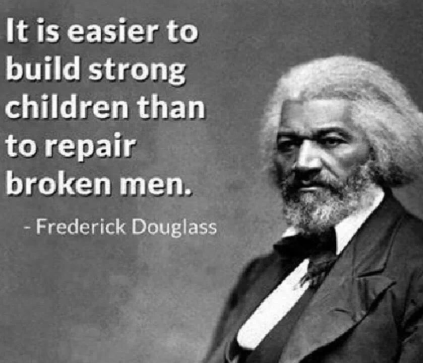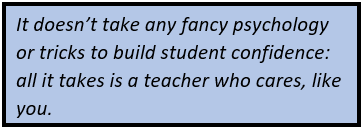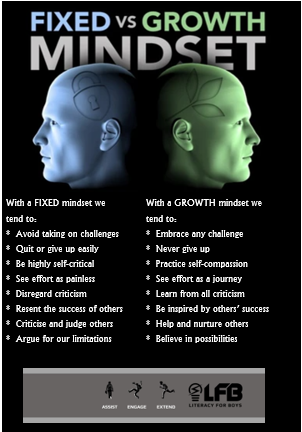Report highlights the connection between student wellbeing and performance

A brand new report by Educator Impact on the importance of student wellbeing states that a child’s social and emotional intelligence is closely connected with their academic outcomes.
Educators and parents universally recognise that social and emotional wellbeing are crucial to overall student outcomes. You may or may not be surprised to know that confidence plays a huge part in learning. Decades of research support the notion that believing in your ability to do something enhances your ability to do it.
What is student wellbeing?
According to The Department of Education and Early Childhood Development (DEECD) student wellbeing is “a sustainable positive mood and attitude, health, resilience, and satisfaction with self, relationships and experiences at school”.
Broadly speaking, student wellbeing encompasses positive mood/attitude, resilience and satisfaction with self, relationships with others and experiences at school.
Why should student wellbeing be a focus for schools?
The recent report carried out by Educator Impact reiterated that the correlation between student wellbeing and academic outcomes is “well established”. For instance, it cites a significant student wellbeing survey published in

Highlighting the importance of wellbeing
the Journal of Positive Psychology that found students who reported “feeling good” and “doing good” gained “superior grades, higher self-control and lower procrastination than students who were moderately mentally healthy or languishing”.
Conversely, students with poor mental health experience significant learning and performance challenges at school.
A concern for educators is the growing number of students who identify as experiencing mental health challenges. The Mission Australia Youth Survey of 2019 reported that 43% of young people (15-19) feel ‘extremely’ or ‘very concerned’ about coping with stress; a three-fold increase since 2012 .
Critically for schools, the same study found that a third of students would turn to a teacher or school counsellor for help instead of family and friends.
Importantly, the report acknowledged that teachers are not mental health professionals and can’t be expected to diagnose mental disorders.
How can we address these critical challenges?
A learner who has belief in their abilities will set themselves challenging goals, be motivated to achieve them, put in effort and use appropriate strategies to perform well.
On the other hand, a learner without self-efficacy (self-confidence) will set themselves low-level goals, not put in the effort (why bother trying when you think you’ll fail?), not use appropriate strategies and not perform well. As a result, their confidence and motivation levels will continue to fall.

We’re at the start of a new term and the last half of the year. A confident learner is a happy and productive one, and every teacher wants a class full of them!
5 Tips for Building Learner Confidence
- Set learning goals together
An important part of building student confidence is making sure everyone is on the same page about learning goals. Often in teaching our learners are kept in the dark about expectations, guidelines, and desired learning goals. If learning intentions are clear, we can encourage self-directed learning.
2. Encouraging self and peer assessment
This can be a tricky one for teachers. However, there are positives in giving students the responsibility for helping both themselves and others in improving their learning by encouraging ownership.
3. Giving useful feedback
Consistent and valuable feedback allows students to learn from their mistakes and also experience ownership of their efforts. Some learners are visual so graphing results can be useful.
4. Brain dump
Often students lose their confidence because they feel like they’re struggling more than they are. Try the brain dump technique: get learners to unpack everything they have learned by jotting it down on a blank piece of paper. This way, they can realise that learning and knowledge gain have been happening. It builds on a student’s confidence and can be used with teacher feedback to fill in any gaps.
5. Show them that effort is normal
The biggest confidence killer for a student is thinking that they are the only ones who doesn’t understand something. Beyond doubt, this attitude is humiliating, demoralising, and utterly destructive in their learning journey. However, the key thing that a struggling student has to have an awareness of is that even the so-called “smarter” kids have to work hard much of the time.

You can inspire confidence in your learners every day with the help of the growth mindset. Click here for a free printable GROWTH MINDSET poster for your classroom or office. This digital PDF resource will give both you and students a daily reminder of how adopting the growth mindset can change everything, both in the classroom and in life!
We can help with improving student confidence in literacy
“By better understanding why our boys struggle with literacy, we’ve been able to develop an online learning platform that is hugely effective in improving boys’ comprehension, reading and spelling,” says Tanya Grambower, founder of Literacy for Boys.

Parent and teacher feedback has been overwhelmingly positive with 100% of our schools renewing their subscriptions in 2020. Literacy For Boys received outstanding results from a school trial in 2018. The study showed participants’ results improve significantly. Tested age for spelling, reading & comprehension improved by up to 52 weeks in just 18 weeks using the program! See here for full results.
We are offering a FREE 2 week trial of Literacy for Boys. Try it for yourself and see how it works for your class and children (8 years to 15 years). Contact us today: info@literacyforboys.com.au
Check out our blogs for more ideas and tips.
Noticed gaps in your child’s learning since remote learning? We offer the solution
Boys don’t read enough: changing the non-reading mindset
How LFB is gaining real results in improving literacy
Boys Love LFB – Here’s what they have to say!
Get boys reading in the digital age
Why write? Tips for reluctant writers
Brought to you by Tanya Grambower
